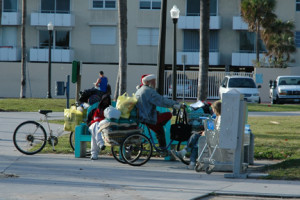Fort Lauderdale joins bandwagon of FL cities passing anti-homeless laws

By Marianela Toledo | Florida Watchdog
MIAMI — Laws popping up around Florida make it pretty clear to the homeless they’re not welcome.
New rules ban panhandling, fundraising and solicitation at busy intersections in Fort Lauderdale. They also prohibit sleeping in public buildings in the city center.
HOMELESSNESS NO: Fort Lauderdale is the last city that rules ban panhandling, fundraising and solicitation at busy intersections
Commissioners say the measures are about safety and aren’t aimed at any particular group, according to the Sun-Sentinel.
But the National Law Center on Homelessness & Poverty, an organization that fights for the legal rights of the homeless and economically vulnerable, believes the measures reflect a national trend and primarily target the homeless.
In a report released last July, the agency says similar laws are active in more than a dozen cities throughout Florida including such municipalities as Dayton Beach, Gainesville, Jacksonville, Key West, Orlando, Sarasota and Tampa.
Other “public safety” measures include Sarasota’s public parks anti-smoking law, which appears to be aimed more at discouraging homeless folks from hanging around parks than protecting the public from the effects of secondhand smoke.
“Our report shows that the criminalization measures are cast at the local level,” said Tristia Bauman, housing attorney with the center.
Although Florida has laws that protect the basic survival activities of homeless people, Bauman said cities are beginning to encroach on the state code.
“Even in places where you have certain protections such as the City of Miami, we see continued efforts to remove those protections,” she said.
In 2013, Miami attempted to arrest people living on the streets who refused to go to a shelter. The courts ruled the jailing of homeless people unconstitutional.
Those in favor of using police tactics say homeless people scare tourists and residents when they drink, act aggressively, defecate and urinate in public.
“There is no doubt that poverty is a social problem that creates many legitimate concerns in the minds of citizens,” Bauman said. “However, using the judicial system to treat poor people as a criminal act is not the answer.”
“Not only civil rights are violated, it does not work and perpetuates the problem.”
The organization is trying to convince cities not to jail the homeless and use the money saved on incarceration to provide shelter and care programs. Similar programs implemented in Salt Lake City, Utah, led to a 75 percent drop in homelessness over the past three years.







